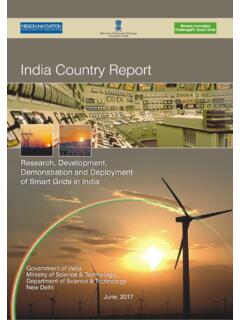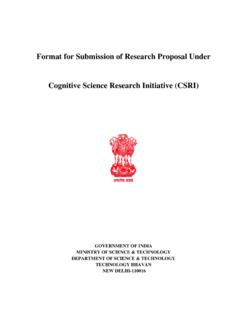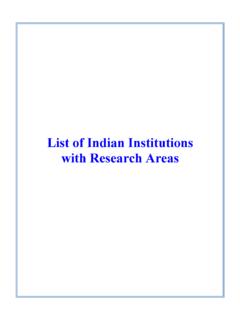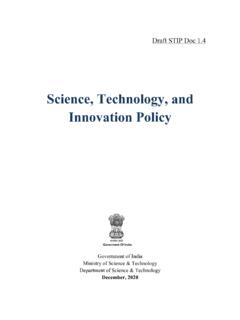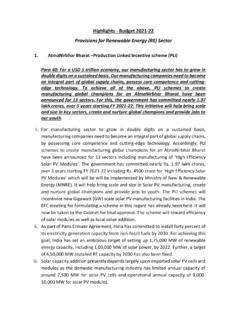Transcription of Sub: Guidelines for acquiring and producing Geospatial ...
1 DST (Part-I) dated 15th February, 2021 1 Sub: Guidelines for acquiring and producing Geospatial Data and Geospatial Data Services including Maps ** Preamble Location information is an integral part of the modern digital ecosystem and critical for unlocking economic, social and environmental opportunities for sustainable growth and development of the country. It is critical to the success of modern industry offering location-based services such as e-Commerce, delivery and logistics and urban transport. It is also essential for more traditional sectors of the economy such as agriculture, construction and development and mines and minerals.
2 2. Geospatial data which includes location information are data about the natural or man-made, physical or imaginary features whether above the ground or below, boundaries, points of interest, natural phenomena, mobility data, weather patterns, statistical information, etc. There has been immense progress over the years in technology for capture of Geospatial data through ground-based survey techniques, photogrammetry using manned/unmanned aerial vehicles, terrestrial vehicle mounted Mobile Mapping System, LIDAR, RADAR Interferometry, satellite-based remote sensing, mobile phone sensors and other techniques.
3 3. The Government of india acknowledges that the availability of comprehensive, highly accurate, granular and constantly updated representation of Geospatial Data will significantly benefit diverse sectors of the economy and will significantly boost innovation in the country and greatly enhance the preparedness of the country for emergency response. Atmanirbhar Bharat 4. The availability of data and modern mapping technologies to Indian companies is also crucial for achieving india 's policy aim of Atmanirbhar Bharat and the vision for a five trillion-dollar economy. india presently relies heavily on foreign resources for mapping technologies and services.
4 Liberalisation of the mapping industry and democratization of existing datasets will spur domestic innovation and enable Indian companies to compete in the global mapping ecosystem by leveraging modern Geospatial technologies. Locally available and locally relevant Maps and Geospatial Data would also help in improved planning and management of resources and better serve the specific needs of the Indian population. 5. Blue economy in india is another sunrise issue for development experts where Geospatial Data is expected to play a potentially important role. Fisheries, deep sea mining, and offshore oil and gas make up a large section of india s blue economy.
5 The Sagarmala project, launched by the Government of india , is the strategic initiative for port-led development. india will soon launch an ambitious Deep Ocean mission that envisages exploration of minerals, energy and marine diversity of the underwater world, a vast part of which still remains unexplored. DST (Part-I) dated 15th February, 2021 2 Bathymetric Geospatial Data would be crucial for attainment of a flourishing and vibrant blue economy for the country and would require active participation of private sector in acquisition and their use apart from traditional agencies like Navy, etc. 6. With the advent of publicly available Geospatial services, a lot of Geospatial Data that used to be in restricted zone are freely and commonly available now and some of the policies/ Guidelines that used to regulate such information have been rendered obsolete and redundant.
6 What is readily available globally does not need to be regulated. Definitions: 7. (a) Positional data: Latitude, longitude and elevation/depth of a point or its x, y & z co-ordinates in the territory of the Republic of india . (b) Attribute data: Any data that when associated with Positional Data gives any additional meaning to it. (c) Geospatial Data: Positional data with or without attribute data tagged, whether in the form of images, videos, vector, voxel and/or raster datasets or any other type of Geospatial dataset in digitized or non-digitized form or web-services. (d) Map: Symbolic representation of real-world objects, regions or themes on a given scale which was generally published in paper form but now also available as web-map-service.
7 (e) Geospatial Technology: Any technology including but not limited to Aerial / UAV Photogrammetry, Aerial / UAV LIDAR, drones, Radar Interferometry, street view or by other means of ground survey, satellite- based remote sensing techniques, AI, underwater mapping, and others. (f) Indian Entity: Any Indian citizen, Government entities, Societies registered under applicable statutes, statutory bodies, Autonomous Institutions of the Government, or any Indian company or Indian LLP owned by resident Indian citizens or any Indian company or Indian LLP controlled by resident Indian citizens (as defined in the Explanation to Rule 23 of the Foreign Exchange Management (Non-Debt Instrument) Rules, 2019).
8 Liberalisation of acquisition and production of Geospatial data and Geospatial data services including maps: 8. Accordingly, the following Guidelines on acquiring and producing Geospatial data and Geospatial data services are issued in supersession of anything to the contrary on the subject issued from time to time by Department of Science and Technology (DST), Ministry of Defense (MoD) and/or any other Department of Government of india vide their various official memoranda and Guidelines . The Guidelines issued by DST on Geospatial Data and Maps would be the single point reference on the subject. i. These Guidelines will be applicable to Geospatial Data, Maps, products, solutions and services offered by government agencies, autonomous DST (Part-I) dated 15th February, 2021 3 bodies, academic and research institutions, private organizations, Non-Governmental Organizations and individuals.
9 Ii. (1) Save as specifically provided for under these Guidelines , there shall be no requirement for prior approval, security clearance, license or any other restrictions on the collection, generation, preparation, dissemination, storage, publication, updating and/or digitization of Geospatial Data and Maps within the territory of india . Individuals, companies, organizations, and Government agencies, shall be free to process the acquired Geospatial Data, build applications and develop solutions in relation to such data and use such data products, applications, solutions, etc by way of selling, distributing, sharing, swapping, disseminating, publishing, deprecating and destructing.
10 Self-certification will be used to convey adherence to these Guidelines . (2) Nothing contained in these Guidelines shall confer on any individual or an entity a right to physical access including through aerial/territorial water route to any establishment, installation or premises to which access is restricted by the Ministry/Department concerned as the owner of such premises. iii. (a) There shall be a negative list of sensitive attributes that would require regulation before anyone can acquire and/or use such attribute data. DST will notify this list on its website along with stipulated regulations after consultation with departments concerned.
